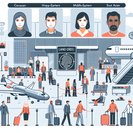
Starting 29 October 2025, U.S. Citizenship and Immigration Services (USCIS) will no longer accept personal checks, cashier’s checks or money orders for any paper-filed benefit request. A press release issued late Wednesday states that fee payments must now be made electronically by credit or debit card using Form G-1450 or via ACH debit from a U.S. bank account using new Form G-1650.
USCIS says the change is part of its larger “paper-to-digital” modernization agenda aimed at reducing lockbox backlogs, eliminating check-fraud risk and shortening fee-reconciliation times. For applicants accustomed to couriering thick application packets with paper checks attached, the shift will require process adjustments. Law firms and corporate immigration teams should create dedicated corporate cards or segregated bank accounts to manage large-volume ACH transactions and must train staff on safeguarding card data that will now be written on every submission.
The agency confirmed that the policy applies only to paper filings; applicants using the myUSCIS online portal already pay electronically and are unaffected. Premium-processing filings, which must still be sent to service-centers rather than lockboxes, are also covered—petitioners will attach the card-authorization form instead of a check. Filings received on or after 29 October with non-electronic payment will be rejected, potentially jeopardizing time-sensitive H-1B change-of-status deadlines or L-1 extension windows.
For employers, the main advantage is faster fee acceptance and fewer “rejected payment” notices when checks bounce due to printing errors or stale dates. The downside is tighter internal controls: corporate card limits may need temporary increases, and ACH transactions require treasury-department coordination. Foreign nationals filing pro se, particularly those without U.S. credit history, could find the new requirement challenging; community nonprofits are advising clients to open low-cost bank accounts well before filing dates.
USCIS expects the electronic mandate to pave the way for full e-filing of all major forms by FY 2027, further accelerating adjudication and data analytics. Stakeholders have 60 days to submit public comments, though the rule is already in force.
USCIS says the change is part of its larger “paper-to-digital” modernization agenda aimed at reducing lockbox backlogs, eliminating check-fraud risk and shortening fee-reconciliation times. For applicants accustomed to couriering thick application packets with paper checks attached, the shift will require process adjustments. Law firms and corporate immigration teams should create dedicated corporate cards or segregated bank accounts to manage large-volume ACH transactions and must train staff on safeguarding card data that will now be written on every submission.
The agency confirmed that the policy applies only to paper filings; applicants using the myUSCIS online portal already pay electronically and are unaffected. Premium-processing filings, which must still be sent to service-centers rather than lockboxes, are also covered—petitioners will attach the card-authorization form instead of a check. Filings received on or after 29 October with non-electronic payment will be rejected, potentially jeopardizing time-sensitive H-1B change-of-status deadlines or L-1 extension windows.
For employers, the main advantage is faster fee acceptance and fewer “rejected payment” notices when checks bounce due to printing errors or stale dates. The downside is tighter internal controls: corporate card limits may need temporary increases, and ACH transactions require treasury-department coordination. Foreign nationals filing pro se, particularly those without U.S. credit history, could find the new requirement challenging; community nonprofits are advising clients to open low-cost bank accounts well before filing dates.
USCIS expects the electronic mandate to pave the way for full e-filing of all major forms by FY 2027, further accelerating adjudication and data analytics. Stakeholders have 60 days to submit public comments, though the rule is already in force.








